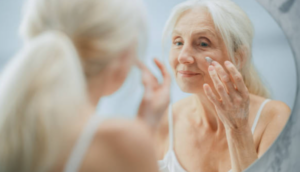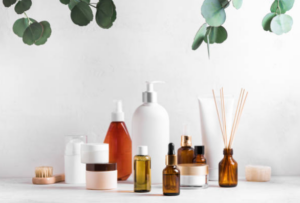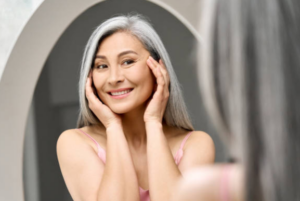Elixir of Youth or Snake Oil?

In the ever-evolving world of beauty and skincare, the pursuit of eternal youth has fueled the creation of countless anti-aging products, each promising to turn back the clock on our skin. From serums and creams to masks and supplements, the market is flooded with a myriad of potions claiming to be the elixir of youth. But are these products genuine miracles or merely modern-day snake oil? In this comprehensive exploration, we’ll dissect the truth behind anti-aging product claims, separating science-backed solutions from potentially deceptive promises.
Before delving into the intricacies of anti-aging products, it’s crucial to grasp the fundamental processes that contribute to aging skin. Aging is a complex interplay of intrinsic and extrinsic factors, both of which impact the skin’s appearance and vitality.
- Intrinsic Aging: Also known as chronological aging, intrinsic aging is influenced by genetic factors and the natural passage of time. As we age, our skin naturally undergoes changes such as a decrease in collagen and elastin production, resulting in the formation of fine lines and wrinkles.
- Extrinsic Aging: Extrinsic aging is primarily caused by external factors, including sun exposure, pollution, smoking, and lifestyle choices. These factors accelerate the aging process, leading to premature wrinkles, hyperpigmentation, and a loss of skin elasticity.
The Rise of Anti-Aging Products
The pursuit of timeless beauty has propelled the anti-aging product market into a dynamic and multifaceted industry, characterized by innovation, scientific advancements, and a relentless desire to unlock the secrets of youthful skin. This surge in popularity can be attributed to various factors that have shaped the landscape of anti-aging skincare.
- Technological Advancements: Over the years, advancements in skincare technology have paved the way for sophisticated formulations with targeted effects on aging skin. From state-of-the-art delivery systems that enhance ingredient penetration to cutting-edge research in cellular rejuvenation, technology has played a pivotal role in shaping the efficacy of anti-aging products.
- Consumer Awareness and Education: Increased awareness and education among consumers regarding skincare ingredients and their effects have fueled the demand for more advanced and effective anti-aging solutions. With access to information through the internet and social media, consumers are now better equipped to make informed decisions about the products they choose to include in their skincare routines.
- Celebrity Endorsements and Influencer Culture: The influence of celebrities and social media influencers has significantly contributed to the popularity of anti-aging products. High-profile endorsements and the visible transformations of well-known personalities create a sense of aspiration, driving consumers to seek out the products that promise similar results.
- Expansion of the Beauty Industry: The beauty industry’s exponential growth has led to an influx of new brands and products, each vying for a share of the lucrative anti-aging market. This expansion has not only increased competition but has also spurred innovation, prompting brands to differentiate themselves through unique formulations and marketing strategies.
- Diversification of Product Offerings: Anti-aging products no longer come in a one-size-fits-all package. The market now offers a diverse array of formulations tailored to specific skin concerns and demographics. Whether addressing fine lines, wrinkles, sagging skin, or age spots, consumers can find products designed to meet their unique needs.

Key Ingredients in Anti-Aging Products
- Retinoids (Retinol, Retin-A): Retinoids are derivatives of vitamin A known for their ability to stimulate collagen production and promote cell turnover. They are effective in reducing fine lines, wrinkles, and hyperpigmentation, making them a cornerstone in many anti-aging formulations.
- Hyaluronic Acid: Hyaluronic acid is a hydrating powerhouse that occurs naturally in the skin. It has the capacity to retain water, providing a plumping effect that reduces the appearance of fine lines and wrinkles. When used in skincare, it helps maintain skin moisture and suppleness.
- Vitamin C: As an antioxidant, vitamin C helps neutralize free radicals, protecting the skin from oxidative stress. It also plays a role in collagen synthesis, contributing to improved skin texture and a more youthful complexion.
- Peptides: Peptides are amino acid chains that can stimulate collagen production and promote skin firmness. They are often included in anti-aging products to target sagging skin and the loss of elasticity.
- Alpha Hydroxy Acids (AHAs) and Beta Hydroxy Acids (BHAs): AHAs, such as glycolic acid, and BHAs, like salicylic acid, exfoliate the skin by removing dead cells, revealing a brighter and smoother complexion. Regular exfoliation can reduce the appearance of fine lines and improve overall skin texture.
- Niacinamide (Vitamin B3): Niacinamide is known for its anti-inflammatory and antioxidant properties. It can help improve skin elasticity, reduce redness, and address hyperpigmentation, making it a versatile ingredient in anti-aging formulations.

The Truth Behind Anti-Aging Claims
- Retinoids: Scientifically proven and dermatologist-recommended, retinoids have substantial evidence supporting their efficacy in addressing signs of aging. From reducing wrinkles to improving skin texture, retinoids are a gold standard in anti-aging skincare.
- Hyaluronic Acid: Hyaluronic acid’s ability to hydrate and plump the skin is well-documented. It is particularly effective in combating dryness and dehydration, contributing to a more youthful and supple complexion.
- Vitamin C: Vitamin C’s antioxidant properties make it a valuable addition to anti-aging formulations. It can protect the skin from environmental damage and contribute to a brighter, more even skin tone.
- Peptides: While peptides have shown promise in stimulating collagen production, their effectiveness may vary. Some studies suggest positive results, but more research is needed to fully understand their long-term impact on aging skin.
- AHAs and BHAs: Exfoliation through AHAs and BHAs can indeed improve the appearance of aging skin. Regular use can promote cell turnover, leading to smoother and more radiant skin.
- Niacinamide: Niacinamide has gained recognition for its versatility in addressing various skin concerns, including those associated with aging. It is a well-tolerated ingredient that can contribute to improved skin texture and tone.
Separating Fact from Fiction
While many anti-aging ingredients have scientific backing, the skincare industry is not without its share of exaggerated claims and potentially misleading marketing tactics. Here are some common myths and misconceptions to be aware of when navigating the world of anti-aging products:
- Myth: “Instant Results”: Some products claim to deliver instant or miraculous results. While certain ingredients can provide immediate improvements in skin texture and hydration, the long-term benefits of most anti-aging products require consistent use over time.
- Myth: “Miracle Ingredient”: No single ingredient can address all aspects of aging. The effectiveness of an anti-aging product often lies in its combination of well-researched ingredients and a holistic skincare routine.
- Myth: “Permanent Reversal of Aging”: Anti-aging products can improve the appearance of the skin, but they cannot reverse the aging process entirely. Healthy lifestyle choices, such as proper nutrition and sun protection, play a crucial role in maintaining youthful-looking skin.
- Myth: “One-Size-Fits-All”: Different individuals have unique skin types and concerns. What works for one person may not work for another. Tailoring your skincare routine to your specific needs is essential for optimal results.
- Myth: “Natural Is Always Better”: While natural ingredients can offer benefits, not all synthetic or lab-created ingredients are harmful. Many scientifically formulated compounds have proven efficacy and can be safe and effective for skincare.

Navigating the Anti-Aging Product Market
As consumers embark on the journey to find effective anti-aging solutions, navigating the expansive market becomes a crucial aspect of achieving desired results while avoiding potential pitfalls. The following details provide a comprehensive guide to help individuals make informed decisions and navigate the diverse landscape of anti-aging products.
- Research Ingredients with Precision: Understanding the key ingredients in anti-aging products is paramount. In-depth research on the proven benefits of ingredients such as retinoids, hyaluronic acid, vitamin C, peptides, and antioxidants allows consumers to discern which formulations align with their specific skincare goals.
- Look for Clinical Studies and Evidence: Reputable anti-aging products often undergo rigorous clinical studies to demonstrate their efficacy. Look for products supported by scientific evidence, such as peer-reviewed studies and comprehensive research findings. Brands transparent about their testing procedures contribute to consumer confidence.
- Consider Your Skin Type and Sensitivity: Personalizing your anti-aging routine requires an understanding of your skin type, sensitivity, and specific concerns. Individuals with sensitive skin may benefit from gentler formulations, while those with oily or dry skin may require tailored solutions. Consider consulting with a dermatologist for personalized advice.
- Read Customer Reviews: Real-world experiences shared by other consumers can provide valuable insights into the effectiveness and potential side effects of a product. Look for reviews from individuals with similar skin types and concerns to gain a more accurate understanding of how a product might perform for you.
- Patch Test New Products: Introducing new products into your skincare routine should be a gradual process. Conduct patch tests to assess how your skin reacts to a product before applying it to your entire face. This precautionary measure helps identify any adverse reactions or irritations.
- Understand the Difference Between Prevention and Reversal: Anti-aging products often fall into two categories: those designed for prevention and those claiming to reverse existing signs of aging. It’s crucial to manage expectations and choose products that align with your goals. Prevention-focused products may emphasize hydration, sun protection, and antioxidants, while reversal-focused products may contain ingredients like retinoids.
- Evaluate Product Formulations: The formulation of a product plays a significant role in its effectiveness. Consider factors such as the concentration of active ingredients, the presence of potential irritants, and the stability of formulations. Packaging that preserves the efficacy of ingredients, such as opaque or airtight containers, is also worth considering.
- Beware of Unrealistic Claims: Be wary of products that make unrealistic or sensational claims. While anti-aging products can yield impressive results over time, promises of immediate transformations or permanent reversals of aging should be approached with caution. Genuine anti-aging benefits often require consistent and long-term use.
The quest for the elixir of youth has fueled the creation of a vast array of anti-aging products, each claiming to possess transformative powers. While genuine breakthroughs in skincare science have led to the development of effective formulations, it’s crucial to approach the market with a discerning eye. Separating fact from fiction involves understanding the aging process, recognizing scientifically backed ingredients, and navigating the myths and misconceptions that permeate the industry.
Ultimately, achieving youthful-looking skin involves a holistic approach that extends beyond skincare products. Healthy lifestyle choices, such as a balanced diet, hydration, sun protection, and stress management, play integral roles in maintaining skin vitality. As you embark on your anti-aging journey, remember that the truth behind these products lies in a combination of science, diligence, and a commitment to overall skin health.




